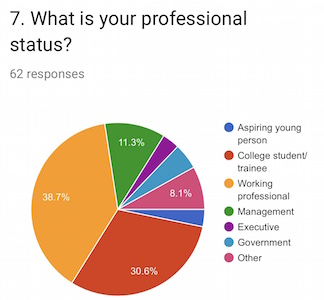This project also consisted of Social Media Marketing work that helped to not only inform our research and communication efforts, but it also helped to raise awareness indirectly through asking for people's opinions about a sensitive topic, thus provoking them to consider the issue more deeply and hopefully look into the resources provided to educate themselves and others.
Social Media Marketing Results
Gender

Most of our respondents were female, although college students are usually split fairly evenly. However, this may be accounted for by considering that many people outside our target audience were reached by this survey.
Age

The largest number of respondents were outside our target audience of college students (although some students are bit older, most aren't). However, we planned for this by creating questions that would allow people of various groups to share their input without keeping us from learning more from our target audience.
Race

This pie chart shows that most of our respondents were white/caucasian. While this appears to be fairly in line with our target audience, it serves to highlight another issue in the sphere of digital diversity. A question for another time would be why so few people of color are represented among the tech industry.
Education

While some college students who have only just begun college may have answered this survey and reluctantly answered that they finished High School only, it is probably more likely that some amount of working people who spend time on social media and pay attention to the tech industry but haven't yet begun their college educations noticed our survey and decided to share their views.
While these people aren't technically a part of the target audience, they are users of the web just like those we aim to help, which makes their opinions valuable to the question in our survey that focused on perception of web accessibility.
Income

It appears that most of our respondents make much more money than a typical college student. While this is surprising, it isn't too surprising when one considers that many more wealthy people have extra time to spend socializing than average working class people, especially those who are working full or part time to pay their way through college.
These wealthy, most likely white females were probably socializing on the Internet when they noticed our survey and felt inclined to share their opions. Thankfully, we had questions targeted to them as well.
Professional Status

This pie chart makes a lot of sense and helps use to recognize that the 30.6% of people who say they are students/trainees exactly matches the amount who said they had some college in a previous question. This confirms the amount of people who fit the target audience that took part in this survey. It may be possible to correlate the amount of students to some of the answers in following questions. However, that level of analysis has yet to be undertaken, let alone completed.
Focus

This is one of the most useful metrics we gained in this survey because it shows that most of our respondents consider the web to be sufficiently improved when it comes to visual impairments. The interview we conducted with Joe Pyles, the president of the Accessibility Club here at WSUV, brought to light the view that he shared concerning screen reading technology being sufficent for most websites, if only they were written in a sensible and logical way. This data helps support our assertion that focusing on cognitive disabilities would be a more reasonable choice for anyone involved in this kind of work and decision making.
Attention

This graph is also revealing in that it shows that a majority of respondents also recognized the importance of improving the accessibility of websites for those with cognitive disabilities. This also shows that the problem is not for a lack of awareness, but rather most likely for a lack of knowledge of how people can start to make a difference in this area. First of all, it should start with people informing themselves and others with the facts. Thankfully so many resources exist, including this website and the links we've shared, to help provide the pertinent information to the right audience.